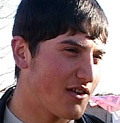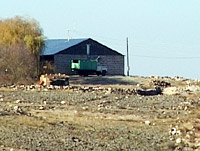
Forgotten Koghbavan
The people of Koghbavan buy their drinking water by the bucket. “I bring a cistern of water once every five days and sell it for a very symbolic sum – only 500 drams,” said Serob Serobyan, the head of the Koghbavan community administration.
“We use it sparingly, trying to do a number of things with one vessel of water. However, it's better now – we know that there will be a cistern of water each week… Can you imagine our condition in the winter, when the roads are closed and we are trapped in this place?” complained Ashkhen Rafaelyan, who was originally from the neighboring village but moved here after marrying a local.
Koghbavan is a young village, built in 1986. The residents are young as well – they have come here from different areas within the Armavir region. There are currently thirteen families living in Koghbavan. Village head Serobyan said that they were “ignored by everyone because there were few voters - 86 adults means only 86 voters.”
“There are houses which have been locked, and the residents have left,” said the villagers. When asked why they did not follow suit and leave, the only member of the village intelligentsia, school teacher Hamlet Hakobyan said that if they were taken care of – if only the water problem were solved – not only would they not leave but they would also build and develop Koghbavan.
 |
 |
 |
 |
| Ashkhen Rafaelyan | Serob Serobyan | Hamlet Hakobyan | Romik Ozmanyan |
“There are hectares of land – there is land everywhere you look. But we can't cultivate it because of a lack of irrigation water. And soil which is not irrigated for a long time is ruined and becomes unfit for use. Instead of taking charge of the villagers and standing by them, so that they cultivate the land and stand firm, they do the contrary – causing them problems and disappointment,” said Hakobyan, the teacher-turned-water-bearer, sharing his concern.
Koghbavan is a border village in the Armavir Marz. In Koghbavan, where snakes and scorpions are regular sights, it is only the availability of electricity that serves a reminder of civilization.
A year ago, the lifestyle of the villagers nearly underwent major changes, until they heard that the organization which held the “key” to their prosperity had gone bankrupt.
“The village was included in a program providing gas supply. We allocated thirty million drams from our meager budget to a company that installed gas pipelines and eagerly waited for the work to start. The gas pipeline reached neighboring Yervandashat but stopped there. We then discovered that the company had gone bankrupt. We renewed the contract a number of times after that, but nothing changed. It wasn't enough that we didn't get gas, but we also lost the thirty million drams. If we'd known how it would turn out, we would have invested fifteen million drams and installed a water pipeline from Yervandashat instead,” said community head Serob Serobyan.
“The only option which I considered positive was to get my children out of here. I took them to a relative's house in Armavir. They live there and go to school there. Shouldn't the village have a school, so that children shouldn't have to go anywhere else for their education? As a teacher, I think education is very important – that is why I have accepted temporary separation from my children. But the others don't care about it… If there were a school in the village, they would definitely send their children there to get an education. But sending them to the next village or to Armavir every day is not something everyone can afford. That is why many children here don't go to school, and illiteracy is on the rise,” Hamlet added.
Romik Ozmanyan, his brother and his sister are all illiterate. Romik has already been called up by the Military Commission, where he informed them that he cannot read or write.
“I'm 18 years old, but have never gone to school. We haven't been able to afford it… My brother and sister are growing up in the same situation. I wish our village had a school, so that every child could get an education,” said Romik.
 “Currently, more than thirty children make a long and difficult journey every day in their quest to get an education,” said the community head.
“Currently, more than thirty children make a long and difficult journey every day in their quest to get an education,” said the community head.
“If only they could provide a small bus for the children, so that they wouldn't have to cover the distance from village to village on foot. This wouldn't be too difficult for the member of parliament from our area, Nahapet Gevorgyan, who owns the rights to a public transport route,” added one of the villagers.
Incidents of snakebites or scorpion attacks are common in desert-like Koghbavan. However, the village has no doctors or health stations to provide first aid. “The victims of snakebites or stings have to be taken to Armavir. We try to avoid illnesses – who needs the trouble of going here and there for treatment? As for pregnant women, we get them out of the village weeks before they're due,” said a resident of Koghbavan who introduced himself as Tenkesh.
“Shouldn't the village have at least one telephone, which we could use in such cases?” asked the community head adding that only after numerous complaints was a telephone line finally installed in the village head's office. “But that phone has remained quiet since the day it was installed.”
Ashkhen Rafaelyan has lived in Koghbavan for only two years, but she is tired already. “It's as if life has come to a standstill, nothing changes. There is the same monotony every day, the same faces. Nobody remembers us. No officials come here – it's as if they don't even know we exist. It's good that you journalists came; at least you'll let people know about us. It'll also give us something to talk about for a few days.”
Haykush Aslanyan
 Videos
Videos Photos
Photos
Write a comment